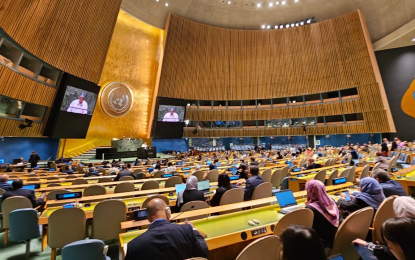
RULE OF LAW. Foreign Affairs Secretary Enrique Manalo delivers the Philippines' statement at the United Nations General Debate in New York City, USA on Sunday (Sept. 24, 2023, PH time). Manalo calls for rules-based order to achieve sustainable goals. (Photo courtesy of DFA)
MANILA – The Philippines vowed to continue to promote a rules-based international order to help attain the global Social Development Goals (SDGs).
Speaking on behalf of President Ferdinand R. Marcos Jr. at the United Nations General Assembly (UNGA) general debate in New York City, USA Sunday (PH time), Department of Foreign Affairs Secretary Enrique Manalo told member-nations that preservation of rules-based global order is everyone’s responsibility.
"The preservation of a rules-based global order is our collective responsibility. The UN is underwritten by a rules-based order governed by international law and informed by the principles of equity and of justice," Manalo said in his speech.
The Philippines is working with other nations to promote peaceful settlement of disputes in accordance with international law as he underscored the country’s position on its issue with China regarding the West Philippine Sea, he said.
“This has always been our position with respect to the disputes in the West Philippine Sea, inasmuch as we are prepared to defend our sovereignty, sovereign rights and territorial integrity," he said.
Manalo, quoting President Ferdinand R. Marcos Jr., said the Philippines is "a friend to all and enemy to none."
"Our constitution renounces war as an instrument of national policy, adopts the generally accepted principles of international law as part of the law of the land and adheres to a policy of peace, equality, justice, freedom, cooperation, and amity with all nations," he said.
Manalo reiterated that the Philippines is a champion of the 1982 UN Convention on the Law of The Sea (UNCLOS), adding that the country is one of the first states to recently sign the Treaty on Marine Biodiversity of Areas Beyond National Jurisdiction, which opens new windows to cooperate in the responsible stewardship of the high seas.
"The primacy of the UNCLOS was affirmed by the 2016 Arbitral Award on the South China Sea. The Award definitively settled the status of historic rights and maritime entitlements in the South China Sea, declaring without legal effect claims that exceed entitlements beyond the geographic and substantive limits of UNCLOS," he said.
He also noted that for the past seven years, the Philippines celebrated the award which is now part of international law.
Danger to humanity
Manalo likewise acknowledged that humanity is still in danger due to the existence of destructive and disruptive weapons.
"All the more, the rule of law must reign. President Marcos Jr. at this Assembly last year called for rules and norms for the responsible use of emerging technologies," he said.
Manalo said the Philippines is advocating for the peaceful uses of outer space, and greater responsibility among states to reduce space threats, including debris from rocket launches.
He called for UN partnerships to ensure that new technologies are not weaponized or misused.
Sustainable development
The Philippines also vowed that the 2030 Agenda for Sustainable Development in the country's mid- and long-term development plans.
"We can unlock opportunities for the Philippines and developing countries, including middle-income countries, to advance South-South cooperation and meet development goals across the world," said Manalo.
Manalo said the Philippines supports initiatives to make international financial and development mechanisms more attuned to the needs of middle-income countries.
Human rights, climate change
The Philippines, as a member of the UN Commission of Human Rights, vowed to be an advocate for the human rights of vulnerable groups, especially women, children, indigenous peoples, migrants, persons with disabilities, refugees, and older persons.
"To foster trust and engagement, dialogue on human rights must be genuine, based on evidence, and depoliticized," he said.
On climate change, the Philippines cited the need for stronger multilateral cooperation.
"We need decisive, responsible, just and sustainable solutions that look after populations and protect persons that have contributed the least to global warming, but have the highest vulnerability by their geography," he said.
The Philippines joined the call for industrialized countries to abide by their obligations under the UN Framework Convention on Climate Change and the Paris Agreement.
"We thank Vanuatu and the core group of states for rallying the UN to bring the question of state obligations relating to climate change to the ICJ (International Court of Justice). The Philippines will actively participate in the proceedings," said Manalo.
Manalo meanwhile said the Philippines is joining the call for solidarity in fostering and advancing a multilateral architecture that promotes the rule of law and meets the pressing challenges of our century.
"Such an architecture demands that we invest wisely in sound, inclusive, and far-sighted multilateral institutions. The Philippines will support multilateral institutions that adhere to the highest standards of good governance, equity, inclusivity, transparency and accountability," Manalo said. (PNA)
